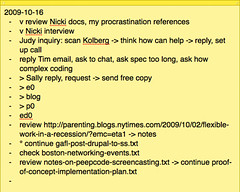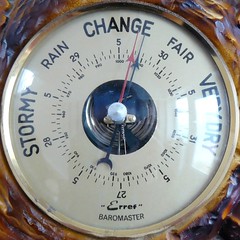Track Your Multitasking and Be Surprised
 Friday, October 16, 2009 at 9:10AM
Friday, October 16, 2009 at 9:10AM I played with a little experiment this week in which I record in real time all activities I'm currently doing. I do this using my daily planning method as a platform (more information doing this kind of tracking in my product). In this case I mark all current activity using ">". In the screen shot you see that I (in this moment) have four going on:
- Writing an email asking for help promoting above product (part of emptying my inbox),
- Clearing out my email inbox,
- Writing this post (a form of capture), and
- Partially ("~") emptying my paper inbox.
Whew!
Yes, I'm aware that I'm multitasking when I'm doing it (occupational hazard), which doesn't make it productive, but tracking it brought it home. What can I do with this data? Ignore it! Seriously, it gives me an excuse to back off a bit. And I'll keep experimenting with a personal informatics principle I'm playing with: Information leads to awareness leads to action leads to insight. (A variation of the three A's: Awareness, Acceptance, Action?)
I'm curious: Feel like giving it a go? Does the informatics principle above hold water? How would you use this data?





